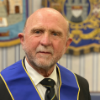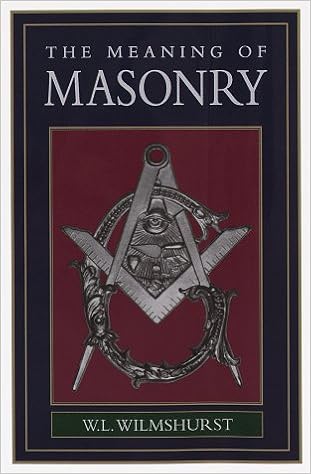Who are the Sojourners , Having self-respect you never compare yourself to others.
Continuing on from the Officers of the Lodge 6 part series, we progress on to the Royal Arch.
This is number 1 of a 5 part tutorial series on the Royal Arch Officers.
Each part published monthly in The Square.
Royal Arch Officers: Janitor, Sojourners, Scribe Nehemiah, Scribe Ezra, Principals.
Ego, according to Ryan Holiday in his book Ego is the Enemy, is the “sense of superiority and certainty that exceeds the bounds of confidence and talent” You will never reach your spiritual goal having an unhealthy ego.
As in Craft Masonry you were taught to be humble in your demeaner by the way you were clothed and stripped of everything with material value.
Humbleness is again the case in the Holy Royal Arch. In Craft you may have reached the dizzy heights of Worshipful Master or even gained promotions in Province or Grand Lodge, but before entering the Holy Royal Arch you are still just at the starting point of your Spiritual journey.
A goal you can only reach with humbleness and humility.

A healthy ego can have the benefits of allowing you to grow with a loving sense of self and a capacity to develop meaningful relationships.
However, an unhealthy or toxic ego, according to Ameet Ranadive, “makes you overestimate your ability and worth and underestimate the effort and skill required to achieve your goal” Solan McClean said “By turning your attention away from the ego you embrace your true spiritual self.”
There is a difference between self-respect and ego. Having self-respect you never compare yourself to others, you compete only with yourself to touch your deeper self, with ego you become manipulative to justify your own means.
The Sojourners
The Sojourners, according to W. L. Wilmshurst, represents your ego, your subconscious, your intelligence, your individuality.
We have already expanded upon the dangers of ego, lets us now look into your subconscious, intelligence and individuality.
The subconscious is;
“the part of your mind that notices and remembers information when you are not actively trying to do so. It influences your behaviour even though you do not realise it.”
During your informative years your mind was open and subjected to many differing attitudes which it stored in your subconsciousness and subsequently resurrected in your attitude and behaviour
Surround yourself with positivity. Contemplate and visualize your goal. In doing so you will develop a strong sense of self-awareness and in the words of Eckhart Toll, “awareness and ego cannot coexist”
Intelligence is;
“the ability to learn, understand and make judgements or have opinions that are based on reason”
Make a daily advancement in Masonic knowledge. Be led by those “Three Great Lights” in Masonry.
It is by reading, reciting and understanding the ritual, as well as your faith, that you will make constant progress towards enlightenment and spirituality.
Individuality is;
“the qualities that make a person different from others”
Every person is unique because every person has had different experiences and made different choices in their lives.
Each person has their own story to tell. You are unique. You are an individual. You have your own story to tell.
Make your story one that ends in virtue, happiness and spiritual enlightenment.
Conclusion
Sojourner is the Hebrew term for “a person (or group) residing either temporarily or permanently in a community or place that is not primarily their own, and is dependent on the “good will” of that community for their continued existence.” John R. Spencer
In the Holy Royal Arch you are seeking the “good will” of the Companions to teach and guide you to your ultimate goal.
Tao Te Ching said, “When the student is ready the teacher will appear”.
In these times of mental health awareness it is “ok not to be ok” Recognise when you need the assistance of a good companion to support you.
Have the humility to ask for help. It will be forthcoming in abundance.
Reflection
The opposite of ego is humility, altruism, humbleness and modesty.
Footnotes
References
The Meaning of Masonry – W. L. Wilmshurst. 1920
Ego is the Enemy – Ryan Holiday
Sojourner Oxford Bibliographies – John R. Spencer
Why is ego the enemy, and what we can do about it. – Ameet Ranadive
The Toxic Ego – Blog :Thoughts and Musing on the Ever Advancing Creation – Solan McClean
The Power of Now – Eckhart Toll
Cambridge Dictionary – dictionary.cambridge.org
Holy Royal Arch Ritual Book.
Article by: Stephen J. Goulding

Stephen was initiated into Freemasonry in 1978 in Tylney Lodge No. 5856 (UGLE). He was Master in 1989 & 2004.
He was Master of the Lodge of Union 38 (UGLE) in 2018. He is also a PZ in the Holy Royal Arch and PM in the Mark Degree.
Stephen served 30 years in the Metropolitan Police Service (London, England) before going into education in 2000, where he became a college lecturer and a mentor for both the college and the University of Greenwich (London, England). Now retired, he teaches Tai Chi and Qigong in the community.
Facebook: Steve Goulding-Tai Chi West Sussex–Chi at Chi

The Meaning of Masonry
By W.L. WILMSHURST
Although the Freemasons number over six million members worldwide, they are a very secretive organization. the general public today thinks of them as a social fraternity like the Rotary Club, but that is hardly the whole truth.
By mysterious coincidence, it seems, many Masons have been major figures in modern history. many of the Founding Fathers of the United States—including George Washington, Thomas Jefferson, Benjamin Franklin, and Paul Revere—were Freemasons.
Giuseppe Garibaldi, the Italian freedom fighter, was also one, as were the composers Franz Joseph Haydn and Wolfgang Amadeus Mozart and writers François Marie Arouet de Voltaire and Johann Wolfgang von Goethe.
The Meaning of Masonry explores the beliefs behind the order, its cryptic rites and symbols, and uncovers its ultimate purpose.
Recent Articles: Officers of the Royal Arch
 Officers of the Royal Arch - The Janitor The Janitor, is a crucial officer in the Royal Arch. Symbolically, the Janitor represents the guardian of sacred knowledge, ensuring only worthy individuals gain access. This function emphasizes the importance of maintaining spiritual purity and safeguarding the mysteries of the Royal Arch. |
 Officers of the Royal Arch - The Sojourners The Sojourners, are seekers of truth, their journey symbolizes the spiritual path to enlightenment. Their role in rediscovering lost wisdom highlights the esoteric concept of regaining divine knowledge through perseverance and self-discovery. |
 Officers of the Royal Arch - Scribe Nehemiah Scribe Nehemiah's responsibility within the Royal Arch, is that of preserving the sacred teachings. Scribe Nehemiah symbolizes the importance of maintaining accurate records and upholding the integrity of divine knowledge, thus reflecting the value of safeguarding spiritual wisdom for future generations. |
 Officers of the Royal Arch - Scribe Ezra Scribe Ezra is portrayed as a crucial figure within the Royal Arch, responsible for interpreting and teaching divine laws. The significance of his role lies in the pursuit of understanding and applying sacred knowledge, emphasizing the transformative power of wisdom when applied to one's life. |
 Officers of the Royal Arch - The Principals The Principals' role in the Royal Arch, representing the pinnacle of spiritual leadership. Their esoteric significance lies in the unity of the three aspects of the divine, emphasizing the importance of harmony and balance in attaining spiritual enlightenment. The Principals embody the ultimate goal of the Royal Arch journey - the realization of divine wisdom. |
masonic knowledge
to be a better citizen of the world
share the square with two brothers

click image to open email app on mobile device








